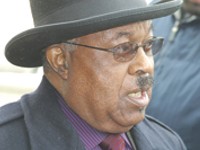Minds changed
[
{
"name": "500x250 Ad",
"insertPoint": "5",
"component": "15667920",
"parentWrapperClass": "",
"requiredCountToDisplay": "1"
}
]
Minds changed
One of the most common images Westerners have of Buddhists is an Asian monk in flowing robes, sitting full lotus in meditation. Change Your Mind Day, a nationwide event presented by Tricycle Magazine and co-sponsored locally by the Rochester Zen Center and the Amitabha Foundation, set out, at least in part, to disabuse people of that image.
"There's no need to be a monastic to practice," says Sensei Bodhin Kjolhede, the abbot of the Zen Center. "I think that misconception comes from popular images in the media. Virtually all Zen practitioners in this country are householders."
The event is primarily designed to expose a wider audience to Buddhist thought. "It's a little intimidating to walk into a Buddhist center," says Frank Howard (pictured) of the Amitabha Foundation. "People think, 'Is it a cult?' 'Are they weird?' 'Do they want money?'"
Apparently, Change Your Mind Day sufficiently lowers the intimidation level, as over 100 people showed up at the Highland Bowl nearly two weeks ago under threatening skies to listen to talks from five different groups about Buddhist teaching. That teaching, according to Sensei Kjolhede, "is that the unenlightened life involves suffering and that all things are in constant change." In his talk, Howard pointed out that, "The pure land is right here, right now, but we don't experience it because of our ignorance."
At the end of his talk, Sensei Kjolhede led a short round of meditation. I had to leave and drop my film off for developing, but I rushed back to the Highland Bowl. As I hurried around the band shell, thoughts swirling in my head of all I still needed to accomplish that day, I was stopped short by a powerful scene: in an open field, about 100 people sitting motionless, meditating.
-- Joseph Sorrentino
Dozen years, no contract
This September makes it a dozen years since Gannett, parent company of the Democrat & Chronicle, ratified a contract with the Newspaper Guild of Rochester. Representatives of both the company and the union have spent the entire 1990s and the first third of the new millennium at the bargaining table, arguing over a few sticking points.
"It's a very unusual situation," says D&C staff writer Steve Orr, the president of the union. "It's not a normal employer-employee relationship."
Meetings between union members and company officials have occurred without any real consistency, Orr says. Instead, they meet "every few months," and very little is actually achieved, he says.
Many of the meetings, Orr says, are spent re-hashing what has been accomplished in earlier meetings and trying to figure out where the negotiations have left off.
"It's difficult to make a push on anything," Orr says.
Orr, who's been with the D&C for more than 20 years, says the guild will not back down without a fair agreement between the parties.
"There are some fairly significant issues having to do with wages, with hours and overtime," he says.
Then there's the company's unwillingness to extend its 401(k) retirement plan to union members.
Though the plan is available to employees, it is not offered to members of the guild, Orr says.
The guild, part of the national Communications Workers of America, has been a local force for almost 70 years and represents about 100 newsroom employees.
Though the local is one of the few remaining to take on Gannett, members stress they have not gone the way of many guilds in other cities which have ceased to exist. The Rochester guild has actually grown, which Orr attributes to the fear newsroom employees have of a future without union protections. (Many of the terms of the expired contract are still in effect, including job-protection provisions and benefits such as health insurance, pension, sick leave, and vacation.)
For now, the meetings will continue. Another is tentatively scheduled for next month.
"We continue to bargain in good faith," Orr says.
Fashionably late
The Comprehensive Annual Financial Report (CAFR) is the "audited, real picture of the county's finances," according to County Legislative Minority Leader Stephanie Aldersley. It's a vital resource for legislators and county officials in their budget deliberations.
This year, though, there may be a legitimate excuse for the tardiness.
According to a letter sent by the county's Chief Financial Officer Steve Gleason to Aldersley, the report's release has been delayed due to a late audit.
"I am waiting for the auditor's opinion on our Comprehensive Annual Financial Report and expect to have it by June 18," Gleason writes.
According to the Monroe County Charter, the CAFR must be presented to the legislature and released to the public by the County Executive no later than the first of June. Before last year, the executive's office enjoyed an eight-year streak of presenting the report ahead of the scheduled deadline.
"In light of Maggie Brooks' recent announcement of a $30 million deficit this year, it is especially important for the Legislature and public to know the county's true financial situation," Aldersley said.
Signs of the times
The billboards are made of vinyl and held by a bracket system that uses tension rods to stretch the ad taut like a drum. The "truck" is a refabricated steel structure less than three feet wide with a lighting system that keeps the ads illuminated from within.
A global positioning system in each truck documents exactly where each advertisement goes --- which, at this point, includes most of Rochester and bits of Syracuse and Buffalo. Advertisers like this element, says Marquis President Ryan Morgan.
"From what we've heard, they like that they get to direct where their message goes," he says. "I've always loved the medium."
Morgan began the operation after noticing its success in large cities like Chicago, Las Vegas, and Miami. With the Fast Ferry approaching, he says, he felt now would be the right time to get it started in Rochester. And he's already booked through the holiday season.
Routes are carefully planned, Morgan says, partly due to the high price of gas. "We're really not in the business of mindlessly driving around," he says. "We don't waste a lot of time being where people aren't." The trucks pause for five or 10 minutes at a particular location, Morgan says, and then move on. They don't put on a "significant" number of miles, Morgan says, though he wasn't able to provide overall gas mileage data.
Morgan will add his third truck July 1, and plans to eventually max out at five.
Changes at RBTL
Since joining the RBTL in 1988, Calocerinos has seen the organization's annual budget grown from $2 million to $11 million.
Calocerinos is moving on, she says, to "focus my energy on my family and personal life."
Three cheers for Renaissance
During his keynote speech at MCC's recent graduation ceremonies, D&C publisher David Hunke urged the community to support the proposal for a combined bus terminal, arts center, and satellite MCC campus at the corner of Main and Clinton, the heart of downtown.
For publishers, taking strong public stances on various issues is certainly not unique. But, according to Gary Hill, chair of the Society of Professional Journalists' ethics committee, Hunke's public support for the project puts the pressure on the D&C to provide thorough and balanced coverage of all the issues surrounding the project.
"If you're seeing a lot of good, in-depth analysis of the project and its positive and negative impact, then I really don't see any problems," Hill says. "If you're not, then you'd question what kind of insulation the newsroom has from its publisher's opinions."








